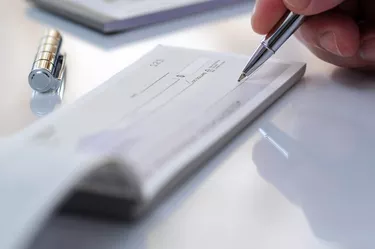
If a certified check turns out to be counterfeit after you withdraw the money, you are legally responsible to pay the bank back. This makes the certified check a favorite tool of some con artists. There is no surefire way to tell if a certified check is fake by looking at it, but you can still protect yourself from certified bank check scams.
Basics of Certified Check Fraud
Video of the Day
When you deposit a bank check such as a certified check or cashier's check, the bank is required by federal law to make the funds available to you on the next business day. This doesn't mean the money has actually cleared the bank or that the check is legitimate. Con artists rely on this fact to steal your money.
Video of the Day
If anyone gives you a bank check and asks you to wire him money under any pretense, you are likely dealing with a check scam and the check will turn out to be counterfeit. The bank will then ask you for its money back, but the person who scammed you will be long gone.
Comparing Certified and Cashier's Checks
This type of scam works the same way regardless of whether the con artist sends you a certified check or a cashier's check, but there are differences between the two. Cashier's checks are drawn on the issuing bank's own funds, so they are often seen as a low-risk way to accept payment. A certified check is a personal check certified by a bank officer. This means the bank guarantees that there is enough money in the account to cover the check and that the customer's signature is valid.
The signature is the easiest way to tell them apart. A cashier's check is signed by the bank and a certified check is signed by an individual. However, the differences between a cashier's check and a certified check don't really matter in this case. If the check is a counterfeit, it's worthless regardless of which type of check it appears to be.
Recognizing Suspicious Signs
Some counterfeit checks are more obvious than others. For instance, a check with a faded-looking bank logo might have been made on a photocopier. Other suspicious signs include a missing bank address, check number or routing number; a routing number without nine digits; a check printed on thin paper stock; or a check with numbers that seem unusually shiny.
A counterfeit check won't necessarily show any of these obvious signs, and you should never rely on your own ability to spot a fake check. Counterfeit checks are often of high quality, featuring correct routing numbers and watermarks that look legitimate, according to the Federal Trade Commission's page on fake checks.
Even the bank can't always tell the difference between a real check and a counterfeit right away, so the only way to protect yourself is to learn how to recognize the signs of a scam.
Spotting Certified Bank Check Scams
There are several different known types of certified bank check scams. You might get a letter in the mail telling you that you have won a lottery in another country or that you've inherited some money. The letter will include a certified check or cashier's check to cover fees or taxes, and instructions to deposit the check in your bank account and then wire the money back to receive your winnings or your inheritance.
Also, you might apply for a job as a secret shopper and be instructed to deposit a check and withdraw the money, then wire the money back to your "employer" with a report on the bank's customer service quality. Finally, you may be contacted by someone who wants to buy something from you, but who wants to use a certified check and pay you more than the listed purchase price so you can then send the extra money to a third party for some reason.
In all of these cases, don't be surprised if the check turns out to be counterfeit after you have withdrawn the money.
Protecting Yourself From Scams
Con artists are always coming up with new scams and new variations on old scams. However, you can protect yourself from all certified check and cashier's check scams with two simple rules:
- Never withdraw money on a check until it has officially cleared the bank.
- Never agree to deposit a check and then wire money to anyone for any reason.